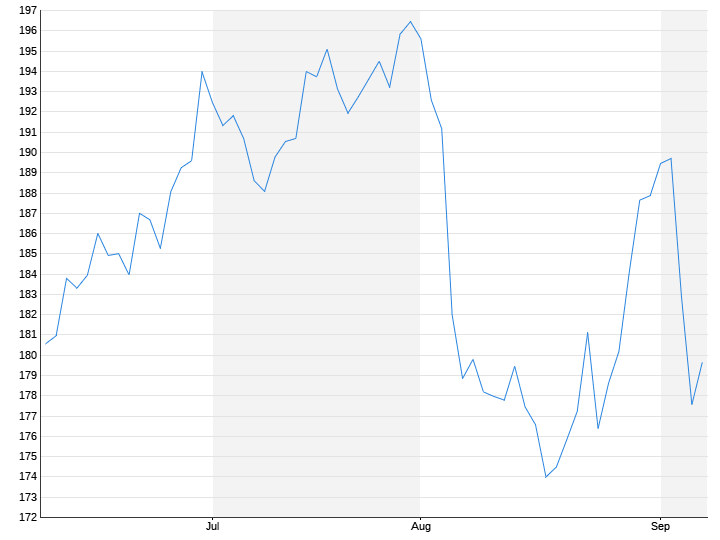iPhone ban for civil servants
China puts pressure on Apple shares
September 8, 2023, 4:46 p.m
Listen to article
This audio version was artificially generated. More Info | Send feedback
Beijing is waging an open battle against the US company Apple. After a ban on use in some ministries, the People’s Republic now wants to ban the company’s smartphones from government service. The consequences are already noticeable on the stock market.
The iPhone ban for public servants announced by China caused prices to plummet on Wall Street just a few days after it was announced. Apple shares are up around one percent in New York – but they lost a total of 6.6 percent on Wednesday and Thursday. This means that more than 200 billion dollars (187 billion euros) of market value disappeared into thin air. However, Apple still has a huge market cap of $2.7 trillion.
China is the Apple company’s most important market outside the United States. The new ban on use could become a bigger problem for the group, warned Neil Wilson, chief analyst at the brokerage firm Finalto. He doesn’t expect a complete ban on iPhones, but the affair – especially in view of the ongoing dispute between the USA and China – will probably keep Apple busy for a long time and will have a significant impact on sales. The People’s Republic contributes at least a fifth of the group’s sales.
Beijing has been restricting the use of iPhones by government officials in some agencies for years. Amid ongoing tensions between China and the West, the People’s Republic has now launched another strike against the US company. As the Japanese business newspaper “Nikkei” reported, China wants to extend the current ban on the use of iPhones in the country. In the future, employees of local newspapers and state-owned companies will no longer be allowed to use smartphones in a business context. According to insider information, similar instructions have so far applied to at least three ministries and agencies of the central administration in Beijing.
According to the Wall Street Journal, the officers received the instructions from their superiors in chat groups or meetings at work. According to the newspaper, the measure is another step to reduce dependence on foreign technology and increase cybersecurity. For similar reasons, the US government has already banned numerous Chinese apps from the cell phones of Western authorities. These include, among others, the short video platform TikTok and the telecommunications equipment provider Huawei.
